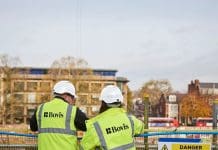Willmott Dixon has been chosen to deliver its largest scheme yet at the University of Warwick, as its set to build the £54.3m Interdisciplinary Biomedical Research Building (IBRB)
The IBRB research facility on the university’s Gibbet Hill campus will be built using a PMV pre-cast concrete frame similar to the one Willmott Dixon used at the Town House for Kingston University.
Designed by Hawkins Brown Architects, the five-storey building will provide 7,000 square meters of new space that will bring together up to 300 biomedical researchers to fight human diseases, utilising features that include a 400-seat lecture theatre and state-of-the-art laboratory facilities as well as various social and collaboration spaces.
The latest contract continues Willmott Dixon’s presence on the campus which has seen the company already deliver the award-winning Oculus Building in 2016 and more recently the Sports and Wellness Hub earlier this year.
Nick Preedy, construction manager at Willmott Dixon: “This continues our relationship with the university which recently saw us complete its new £37m Sports and Wellness Hub.
“The IBRB is really exciting to be a part of; not only will it produce lifesaving research but the construction process itself is something really special; with over half of the project being manufactured off-site, we are able to cut the build time down to just 87 weeks.
“Using PMV not only has a positive impact on the sustainability, logistics and carbon footprint of the build but the factory built environments also provide better quality control, less strain on specialist trades on site and fewer site deliveries. This, in turn, benefits the local community by ensuring the local roads of Coventry and the university are much quieter.”
Professor Sudhesh Kumar, dean of the Warwick Medical School said: “We are very excited about the development of the new IBRB building on the Gibbet Hill site. It forms an integral element of the Medical School’s ambitions over the coming years.
“The inclusion of a brand new lecture theatre will enhance the student experience and enable the growth of new undergraduate programs. The excellent research facilities within the building will foster inter-disciplinary collaboration and enable biomedical research at the highest level.”
The project is due to be completed by the end of 2020.














